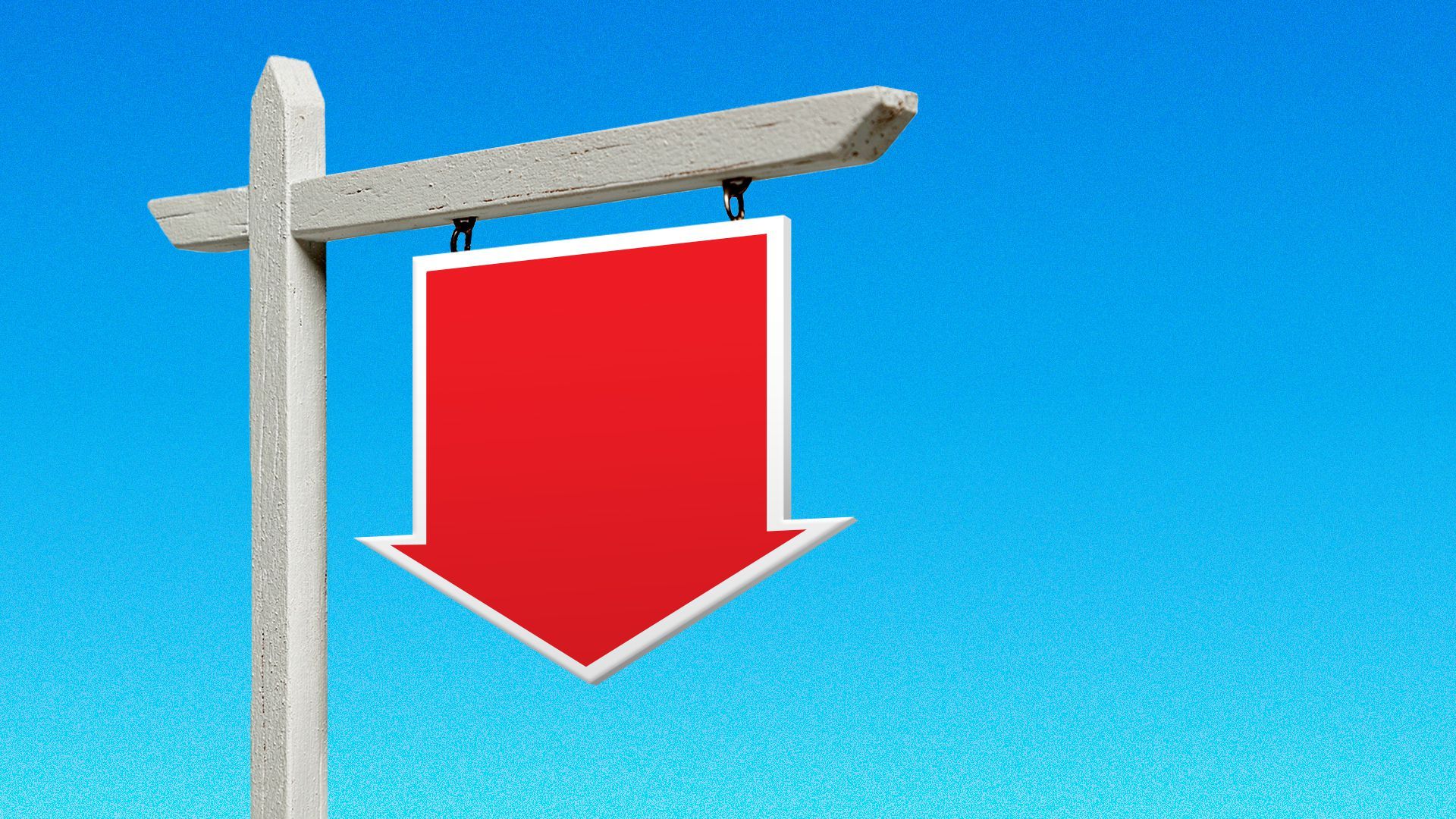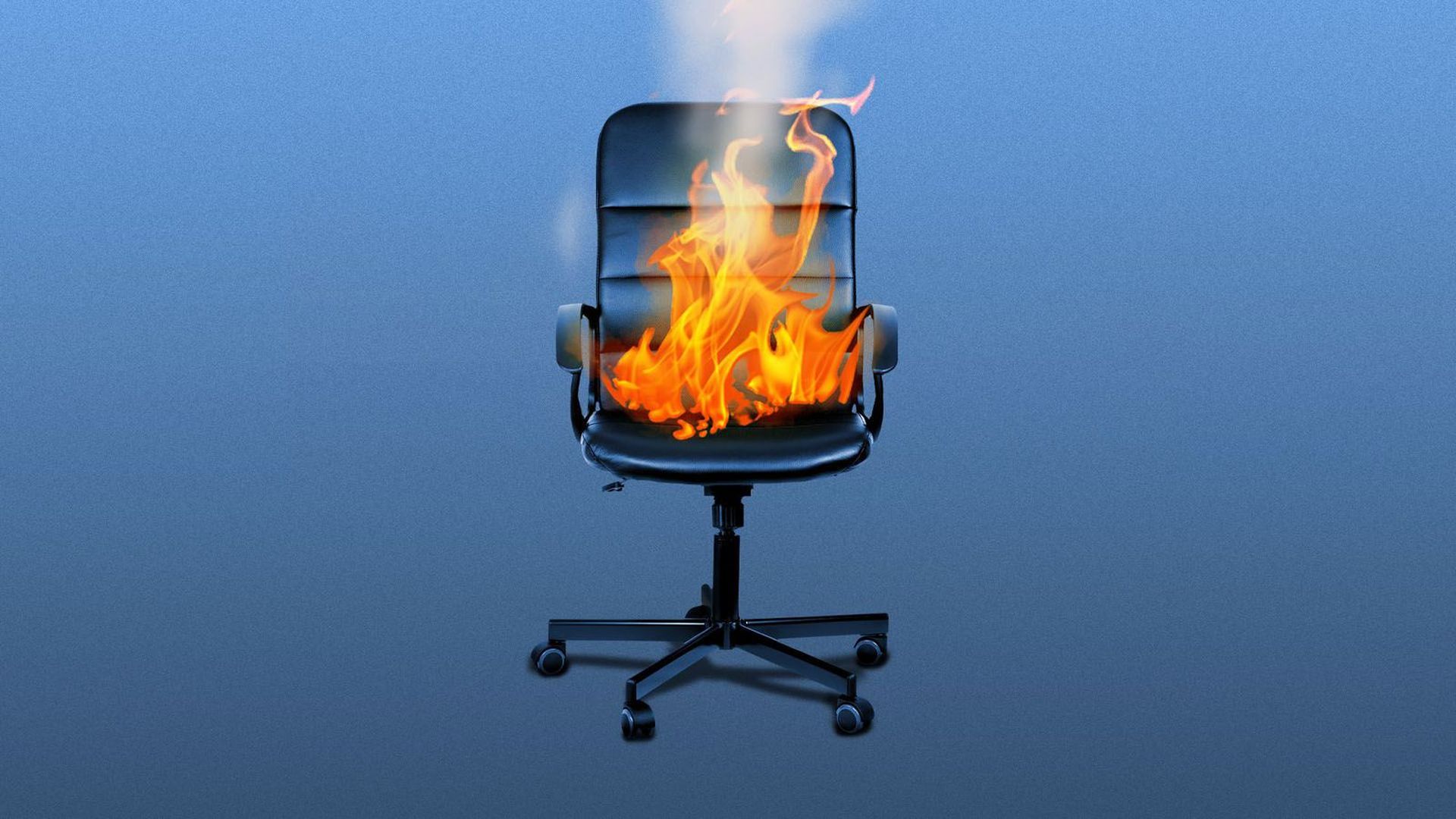| | | | | | | | | | | Axios Markets | | By Emily Peck and Matt Phillips · Jul 28, 2022 | | 🌇 Good morning. Matt here. Today's the day: Second-quarter GDP numbers are due at 8:30am. - There are clearly parts of the economy where activity and prices are falling fast — such as the housing market, a subject which Emily tackles below.
🚨Situational awareness: In a surprise reversal, Sen. Joe Manchin announced support for a climate and tax deal late yesterday, saying it would help reduce inflation. Today's newsletter, edited by Javier E. David, is 890 words, 3.5 minutes. | | | | | | 1 big thing: Housing fizzle |  | | | Illustration: Annelise Capossela/Axios | | | | The housing slowdown we've been anticipating for months is here, Emily writes. Home sales are slowing and some of the pandemic era's hottest "Zoomtowns" — sleepy areas where remote workers pushed up real estate prices — are already seeing price drops. Why it matters: The idea of a real estate downturn might seem scary, especially if you lived through the last one. But with home prices at record highs, this was a market overdue for cooling off. What's happening: "Activity in the housing sector has weakened," is how Fed chair Jerome Powell put it yesterday, at a press conference announcing another 0.75 percentage point rate hike. - Contract signings for home purchases, or deals signed but not yet closed, fell 8.6% in June from a month ago, the National Association of Realtors reported yesterday. That was well above what economists were predicting, and a 20% drop from last year.
- It was also the slowest pace since September 2011 — except for the first two months of the pandemic, notes CNBC.
- Meanwhile, mortgage applications are at their lowest level of activity since February 2000.
What's next: Prices are coming down in some areas, and analysts expect that to continue. What they're saying: "Activity is now in free-fall, inventory is rocketing, and prices have started to fall," Ian Shepherdson, chief economist at Pantheon, said in a note. He's been calling this slowdown for a while. - This wasn't a blip: "We can expect continued downturn as we head into the second half of the year," said George Ratiu, senior economist and manager of economic research at Realtor.com.
Zoom out: This is how the real world is reacting to what's happening at the Fed — mortgage rates jumped, and suddenly houses were even less affordable. Though people would like to buy, they cannot. "The challenge in the housing market is that many Americans so desperately still want to own a home," Ali Wolf, chief economist at Zonda, said in a message to Axios. "But rising home prices and higher interest rates have pushed them to the limit." Read more. |     | | | | | | Bonus chart: Mortgage demand crushed |  Data: Mortgage Bankers Association; Chart: Nicki Camberg/Axios |     | | | | | | 2. ❤️ Stocks love Powell |  Data: FactSet; Chart: Axios Visuals Stocks were soothed by the dulcet tones of Fed chair Jerome Powell at his press conference yesterday, despite the central bank having just delivered another big rate hike, Matt writes. Driving the news: The Fed chief suggested that after three-straight rate increases, officials want to wait and see how those increases would affect the economy. Powell also demurred on the possibility of the U.S. being in a recession. - The Fed has lifted its monetary policy rate from almost zero — where it was in March — to between 2.25% and 2.50% as of yesterday.
What they're saying: "These rate hikes have been large and they've come quickly, and it's likely that their full effect has not been felt by the economy," Powell told reporters. By the numbers: The wait-and-see tone from the Fed chief pushed the S&P 500 to its second-best day this month. - The S&P 500 rose 2.6% and is up 6.3% so far in July.
|     | | | | | | A message from Axios | | Get the news your competitors are reading | | |  | | | | Join the hundreds of companies already using Axios Pro to empower their work. How it works: Axios Pro saves your team time, delivering exclusive deals reporting and analysis you won't find anywhere else. Learn more about corporate special pricing. | | | | | | 3. Catch up quick | | ✈️ JetBlue to buy Spirit Airlines for $3.8 billion. (WSJ) 📱 Amazon plans another Prime Day for October as e-commerce slows. (Business Insider) 👎 Meta posts first-ever revenue drop, offers weak guidance. (Axios) 📉 Probability of default for U.S. retail increases. (Axios Pro) 🇷🇺 U.S. and Europe dig in for long economic standoff with Russia. (WSJ) |     | | |  | | | | If you like this newsletter, your friends may, too! Refer your friends and get free Axios swag when they sign up. | | | | | | | | 4. 💬 Quoted: "We'll never go back..." | "We'll never go back to where we were before the pandemic. But right now, it's a little too lean." -Mary Barra, CEO of General Motors, speaking to analysts this week about the company's existing levels of inventory. Why it matters: Barra's comment seems to confirm that given sky-high prices automakers are getting for vehicles, they are in no rush to boost production back to pre-COVID levels. (Go deeper.) The bottom line: The auto industry paradigm — previously based on mass production and incentive pricing — has changed, with car makers learning to love low supply and high prices. - Nosebleed prices for new vehicles — they hit a record of over $48,000 per vehicle in June — aren't going anywhere.
|     | | | | | | 5. NYC's $58 billion remote work wipeout |  | | | Illustration: Sarah Grillo/Axios | | | | The shift to remote work destroyed about $58 billion, or 33%, in the value of office real estate in New York City through 2021, according to a working paper. The provocatively titled "Work From Home and the Office Real Estate Apocalypse," published earlier this summer, underscores how the work-from-home boom was largely a bust for pricey corporate office space, Emily writes. Why it matters: While no one is crying for big office landlords, the decline in value — and loss of in-person workers it signals — could have significant spillover effects on the city, which depends on a steady stream of commuters to fill up tax coffers. Details: For their paper, the researchers looked at various data, including office building valuations and occupancy rates, real estate investment trust stock prices, and the market for commercial mortgage-backed securities. - Higher-quality office buildings saw less of a decline in value, according to their analysis.
Wait, didn't the authors say something about an "apocalypse"? Since the paper was released online, there's been some pushback on the term, said co-author Arpit Gupta, a finance professor at NYU Stern School of Business. Still, he maintains that this is a significant moment. - "Certainly, we think there are a lot of important knock-on consequences this shift is going to have," Gupta said.
Read more. |     | | | | | | A message from Axios | | Get the news your competitors are reading | | |  | | | | Join the hundreds of companies already using Axios Pro to empower their work. How it works: Axios Pro saves your team time, delivering exclusive deals reporting and analysis you won't find anywhere else. Learn more about corporate special pricing. | | | | 🎙🚨Shameless promotion alert: If you want to hear more from me, Emily, I'm guest-hosting "Axios Today" through Friday. Give it a listen, feel free to email me your thoughts, and we'll see you back here tomorrow! |  | | Why stop here? Let's go Pro. | | | | | | Axios thanks our partners for supporting our newsletters. If you're interested in advertising, learn more here.
Sponsorship has no influence on editorial content. Axios, 3100 Clarendon Blvd, Arlington VA 22201 | | | You received this email because you signed up for newsletters from Axios.
Change your preferences or unsubscribe here. | | | Was this email forwarded to you?
Sign up now to get Axios in your inbox. | | | | Follow Axios on social media:    | | | | | |











No comments:
Post a Comment